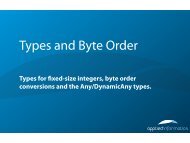Create successful ePaper yourself
Turn your PDF publications into a flip-book with our unique Google optimized e-Paper software.
<strong>Memory</strong> <strong>Management</strong><br />
Reference counting, shared pointers, buffer<br />
management, and more.
Overview<br />
> Reference Counting<br />
> AutoPtr, RefCountedObject and AutoReleasePool<br />
> SharedPtr<br />
> Buffers<br />
> Dynamic Factory and Instantiator<br />
> <strong>Memory</strong> Pools<br />
> Singletons
Reference Counting<br />
[...] Reference counting is a technique of storing the number<br />
of references, pointers, or handles to a resource such as an<br />
object or block of memory. It is typically used as a means of<br />
deallocating objects which are no longer referenced.<br />
Wikipedia
Reference Counting (cont'd)<br />
> Whenever a reference is destroyed or overwritten, the reference<br />
count of the object it references is decremented.<br />
> Whenever a reference is created or copied, the reference count of<br />
the object it references is incremented.<br />
> The initial reference count of an object is one.<br />
> When the reference count of an object reaches zero, the object is<br />
deleted.<br />
> In a multithreaded scenario, incrementing and decrementing/<br />
comparing reference counters must be atomic operations.
Object Ownership<br />
> If someone takes "ownership" of an object, he is responsible for<br />
deleting the object when it's no longer needed.<br />
> If the owner of an object fails to delete it, this will result in a<br />
memory leak.<br />
> Others may point to the object, too, but they will never delete<br />
the object.<br />
> Ownership is transferable. But at any given time there can only<br />
be one owner.
Reference Counting and Ownership<br />
> A pointer taking ownership of an reference counted object does<br />
not increment its reference count.<br />
> This implies that there is no previous owner (in other words,<br />
the object has just been created),<br />
> or the previous owner gives up ownership (and thus does not<br />
decrement the object's reference count).<br />
> Usually, the first pointer an object is assigned to after its creation<br />
takes ownership. All others do not.
The AutoPtr Class Template<br />
> <strong>Poco</strong>::AutoPtr implements a reference counting "smart" pointer.<br />
> <strong>Poco</strong>::AutoPtr can be instantiated with any class that supports<br />
reference counting.<br />
> A class supporting reference counting must<br />
> maintain a reference count (initialized to 1 at creation)<br />
> implement a method void duplicate() that increments the<br />
reference count<br />
> implement a method void release() that decrements the<br />
reference count and, when it reaches zero, deletes the object
AutoPtr Construction and Assignment<br />
> When constructing an AutoPtr from a C*, the AutoPtr takes<br />
ownership of C (and its reference count remains unchanged).<br />
> When assigning a C* to an AutoPtr, the AutoPtr takes<br />
ownership of C (and its reference count remains unchanged).<br />
> When constructing an AutoPtr from another AutoPtr,<br />
both AutoPtr's share ownership of C, and its reference count is<br />
incremented.<br />
> When assigning an AutoPtr to another AutoPtr, both<br />
AutoPtr's share ownership of C, and its reference count is<br />
incremented.
#include "<strong>Poco</strong>/AutoPtr.h"<br />
using <strong>Poco</strong>::AutoPtr;<br />
class RCO<br />
{<br />
public:<br />
RCO(): _rc(1)<br />
{<br />
}<br />
void duplicate()<br />
{<br />
++_rc; // Warning: not thread safe!<br />
}<br />
void release()<br />
{<br />
if (--_rc == 0) delete this; // Warning: not thread safe!<br />
}<br />
private:<br />
int _rc;<br />
};
int main(int argc, char** argv)<br />
{<br />
RCO* pNew = new RCO; // _rc == 1<br />
AutoPtr p1(pNew); // _rc == 1<br />
AutoPtr p2(p1); // _rc == 2<br />
AutoPtr p3(pNew, true); // _rc == 3<br />
p2 = 0; // _rc == 2<br />
p3 = 0; // _rc == 1<br />
RCO* pRCO = p1; // _rc == 1<br />
p1 = 0;<br />
// _rc == 0 -> deleted<br />
// pRCO and pNew now invalid!<br />
p1 = new RCO; // _rc == 1<br />
}<br />
return 0;<br />
// _rc == 0 -> deleted
RefCountedObject<br />
> <strong>Poco</strong>::RefCountedObject implements thread-safe reference<br />
counting semantics. As of 1.3.4 it uses platform-specific atomic<br />
operations, if available (Windows, Mac OS X).<br />
> Can be used as a base class for classes implementing reference<br />
counting.<br />
> <strong>Poco</strong>::RefCountedObject has a protected destructor and<br />
prohibits copy-construction and assignment.<br />
> All reference counted objects should have a protected destructor,<br />
to forbid explicit use of delete.
#include "<strong>Poco</strong>/RefCountedObject.h"<br />
#include "<strong>Poco</strong>/AutoPtr.h"<br />
#include <br />
using <strong>Poco</strong>::RefCountedObject;<br />
using <strong>Poco</strong>::AutoPtr;<br />
class RCO: public RefCountedObject<br />
{<br />
public:<br />
RCO()<br />
{<br />
}<br />
void greet() const<br />
{<br />
std::cout
int main(int argc, char** argv)<br />
{<br />
AutoPtr pRCO(new RCO);<br />
pRCO->greet(); // AutoPtr has -> operator<br />
(*pRCO).greet(); // AutoPtr has * operator<br />
std::cout
AutoPtr Operators and Semantics<br />
> <strong>Poco</strong>::AutoPtr support relational operators:<br />
==, !=, =<br />
> De-referencing operators: *, -><br />
will throw a NullPointerException if pointer is null<br />
> <strong>Poco</strong>::AutoPtr supports full value semantics (default constructor,<br />
copy constructor, assignment) and can be used in collections<br />
(e.g., std::vector or std::map).<br />
> Use AutoPtr::isNull() or AutoPtr::operator ! () to test for null
AutoPtr and Casts<br />
> Like ordinary pointers, <strong>Poco</strong>::AutoPtr supports a cast operation.<br />
> template <br />
AutoPtr cast() const<br />
> An AutoPtr cast is always typesafe<br />
(internally, dynamic_cast is used, so an invalid cast will result in a<br />
null pointer).<br />
> Assignment of compatible AutoPtr's is supported through a<br />
template constructor and assignment operator.
#include "<strong>Poco</strong>/AutoPtr.h"<br />
#include "<strong>Poco</strong>/RefCountedObject.h"<br />
class A: public <strong>Poco</strong>::RefCountedObject {};<br />
class B: public A {};<br />
class C: public <strong>Poco</strong>::RefCountedObject {};<br />
int main(int argc, char** argv)<br />
{<br />
<strong>Poco</strong>::AutoPtr pA;<br />
<strong>Poco</strong>::AutoPtr pB(new B);<br />
pA = pB;<br />
pA = new B;<br />
// okay, pB is a subclass of pA<br />
// pB = pA; // will not compile<br />
pB = pA.cast();<br />
// okay<br />
<strong>Poco</strong>::AutoPtr pC(new C);<br />
pA = pC.cast();<br />
// pA is null<br />
}<br />
return 0;
AutoPtr Caveats and Pitfalls<br />
> Be extremely careful when assigning an AutoPtr to a plain<br />
pointer, and then assigning the plain pointer to another<br />
AutoPtr!<br />
> Both AutoPtr's will claim ownership of the object. This is bad!<br />
> Explicitly tell AutoPtr that it has to share ownership of the object:<br />
> AutoPtr::AutoPtr(C* pObject, bool shared);<br />
> AutoPtr& AutoPtr::assign(C* pObject, bool shared);<br />
> shared must be true!<br />
!
#include "<strong>Poco</strong>/AutoPtr.h"<br />
#include "<strong>Poco</strong>/RefCountedObject.h"<br />
class A: public <strong>Poco</strong>::RefCountedObject<br />
{<br />
};<br />
int main(int argc, char** argv)<br />
{<br />
<strong>Poco</strong>::AutoPtr p1(new A);<br />
A* pA = p1;<br />
// <strong>Poco</strong>::AutoPtr p2(pA); // BAD! p2 assumes sole ownership<br />
<strong>Poco</strong>::AutoPtr p2(pA, true); // Okay: p2 shares ownership with p1<br />
<strong>Poco</strong>::AutoPtr p3;<br />
// p3 = pA; // BAD! p3 assumes sole ownership<br />
p3.assign(pA, true);<br />
// Okay: p3 shares ownership with p1<br />
}<br />
return 0;
AutoReleasePool<br />
> The <strong>Poco</strong>::AutoReleasePool class template takes care of<br />
(reference counted) objects that nobody else wants.<br />
> #include "<strong>Poco</strong>/AutoReleasePool.h"<br />
> <strong>Poco</strong>::AutoReleasePool takes ownership of every object added to<br />
it.<br />
> When the <strong>Poco</strong>::AutoReleasePool is destroyed (or its release()<br />
method is called), it releases the references to all objects it holds,<br />
by invoking each object's release() method.
#include "<strong>Poco</strong>/AutoReleasePool.h"<br />
using <strong>Poco</strong>::AutoReleasePool;<br />
class C<br />
{<br />
public:<br />
C()<br />
{<br />
}<br />
};<br />
void release()<br />
{<br />
delete this;<br />
}
int main(int argc, char** argv)<br />
{<br />
AutoReleasePool pool;<br />
C* pC = new C;<br />
pool.add(pC);<br />
pC = new C;<br />
pool.add(pC);<br />
return 0;<br />
}<br />
// all C's deleted
The SharedPtr Class Template<br />
> <strong>Poco</strong>::SharedPtr implements reference counting for classes that<br />
do not implement a reference count themselves.<br />
> #include "<strong>Poco</strong>/SharedPtr.h"<br />
> <strong>Poco</strong>::SharedPtr has the same features as <strong>Poco</strong>::AutoPtr<br />
(dereferencing, relational operators, etc.).<br />
> WARNING: Assigning plain pointers to the same object to<br />
different SharedPtr's will result in multiple owners of the object<br />
causing undefined behavior (in other words, a crash).<br />
> Once you use SharedPtr for an object, never work with plain<br />
pointers to that object again.<br />
!
SharedPtr1<br />
Reference<br />
Counter1<br />
SharedPtr3<br />
Object1<br />
Reference<br />
Counter2<br />
SharedPtr2<br />
Object2
#include "<strong>Poco</strong>/SharedPtr.h"<br />
#include <br />
#include <br />
using <strong>Poco</strong>::SharedPtr;<br />
int main(int argc, char** argv)<br />
{<br />
std::string* pString = new std::string("hello, world!");<br />
<strong>Poco</strong>::SharedPtr p1(pString); // rc == 1<br />
<strong>Poco</strong>::SharedPtr p2(p1); // rc == 2<br />
p2 = 0; // rc == 1<br />
// p2 = pString; // BAD BAD BAD: multiple owners -> multiple delete<br />
p2 = p1; // rc == 2<br />
std::string::size_type len = p1->length(); // dereferencing with -><br />
std::cout
SharedPtr Operators and Semantics<br />
> <strong>Poco</strong>::SharedPtr support relational operators:<br />
==, !=, =<br />
> De-referencing operators: *, -><br />
will throw a NullPointerException if pointer is null<br />
> <strong>Poco</strong>::SharedPtr supports full value semantics (default<br />
constructor, copy constructor, assignment) and can be used in<br />
collections (e.g., std::vector or std::map).<br />
> Use SharedPtr::isNull() or SharedPtr::operator ! () to test for null
SharedPtr and Casts<br />
> Like ordinary pointers, <strong>Poco</strong>::SharedPtr supports a cast operation.<br />
> template <br />
SharedPtr cast() const<br />
> A SharedPtr cast is always typesafe<br />
(internally, dynamic_cast is used, so an invalid cast will result in a<br />
null pointer).<br />
> Assignment of compatible SharedPtr's is supported through a<br />
template constructor and assignment operator.
#include "<strong>Poco</strong>/SharedPtr.h"<br />
class A<br />
{<br />
public:<br />
virtual ~A()<br />
{<br />
}<br />
};<br />
class B: public A<br />
{<br />
};<br />
class C: public A<br />
{<br />
};
int main(int argc, char** argv)<br />
{<br />
<strong>Poco</strong>::SharedPtr pA;<br />
<strong>Poco</strong>::SharedPtr pB(new B);<br />
pA = pB;<br />
pA = new B;<br />
// okay, pB is a subclass of pA<br />
// pB = pA; // will not compile<br />
pB = pA.cast();<br />
// okay<br />
<strong>Poco</strong>::SharedPtr pC(new C);<br />
pB = pC.cast();<br />
// pB is null<br />
}<br />
return 0;
SharedPtr and Arrays<br />
> The default implementation of SharedPtr will simply call delete<br />
pObj<br />
> Wrong for objects created with new[]<br />
> need delete [] pObj;<br />
> create SharedPtr with a custom ReleasePolicy<br />
> SharedPtr
template <br />
class ArrayReleasePolicy<br />
{<br />
public:<br />
static void release(C* pObj)<br />
/// Delete the object.<br />
/// Note that pObj can be 0.<br />
{<br />
delete [] pObj;<br />
}<br />
};<br />
char* pStr = new char[100];<br />
SharedPtr p(pStr);
The DynamicFactory Class Template<br />
> <strong>Poco</strong>::DynamicFactory supports object creation "by name".<br />
> #include "<strong>Poco</strong>/DynamicFactory.h"<br />
> All classes managed by a DynamicFactory must have a common<br />
base class. The DynamicFactory is instantiated for the base class.<br />
> C* DynamicFactory::createInstance(const std::string& name)<br />
const;<br />
creates an instance of a subclass of C with the given name.<br />
> For this to work, classes and their instantiators (factory classes)<br />
must be registered with the DynamicFactory.
The Instantiator Class Template<br />
> An instantiator for a class C must always be a subclass of<br />
<strong>Poco</strong>::AbstractInstantiator, where Base is a base class of C.<br />
> <strong>Poco</strong>::Instantiator is a template for a factory for a given class.<br />
> It basically defines a method createInstance() that creates a new<br />
instance of a class, using the new operator.<br />
> To work with class hierarchies, an Instantiator always inherits<br />
from <strong>Poco</strong>::AbstractInstantiator, which defines createInstance()<br />
for the base class.
#include "<strong>Poco</strong>/DynamicFactory.h"<br />
#include "<strong>Poco</strong>/SharedPtr.h"<br />
using <strong>Poco</strong>::DynamicFactory;<br />
using <strong>Poco</strong>::SharedPtr;<br />
class Base<br />
{<br />
};<br />
class A: public Base<br />
{<br />
};<br />
class B: public Base<br />
{<br />
};
int main(int argc, char** argv)<br />
{<br />
DynamicFactory factory;<br />
factory.registerClass("A"); // creates Instantiator<br />
factory.registerClass("B"); // creates Instantiator<br />
SharedPtr pA = factory.createInstance("A");<br />
SharedPtr pB = factory.createInstance("B");<br />
// you can unregister classes<br />
factory.unregisterClass("B");<br />
// you can also check for the existence of a class<br />
bool haveA = factory.isClass("A"); // true<br />
bool haveB = factory.isClass("B"); // false (unregistered)<br />
bool haveC = factory.isClass("C"); // false (never registered)<br />
}<br />
return 0;
DynamicFactory and Instantiators<br />
> For the <strong>Poco</strong>::Instantiator class template to work, the class to be<br />
created must be default constructible.<br />
> If your class is not default constructible, or if it requires special<br />
steps for construction, you must implement your own<br />
instantiator class.
#include "<strong>Poco</strong>/DynamicFactory.h"<br />
using <strong>Poco</strong>::DynamicFactory;<br />
using <strong>Poco</strong>::AbstractInstantiator;<br />
class Base<br />
{<br />
};<br />
class A: public Base<br />
{<br />
};<br />
class C: public Base<br />
{<br />
public:<br />
C(int i): _i(i)<br />
{<br />
}<br />
private:<br />
int _i;<br />
};
class CInstantiator: public AbstractInstantiator<br />
{<br />
public:<br />
CInstantiator(int i): _i(i)<br />
{<br />
}<br />
Base* createInstance() const<br />
{<br />
return new C(_i);<br />
}<br />
private:<br />
int _i;<br />
};
int main(int argc, char** argv)<br />
{<br />
DynamicFactory factory;<br />
factory.registerClass("A");<br />
factory.registerClass("C", new CInstantiator(42));<br />
}<br />
return 0;
Buffer <strong>Management</strong><br />
> When interfacing with legacy C libraries or operating system<br />
calls, one often needs to supply a buffer of a certain size.<br />
> If the buffer is larger than a few bytes, it must be allocated on the<br />
heap.<br />
> This requires some kind of memory management, to ensure that<br />
the buffer is deleted when it is no longer used, even in the case of<br />
an exception.<br />
> std::auto_ptr or <strong>Poco</strong>::SharedPtr (with the default release policy)<br />
cannot be used here, because they do not work with arrays.
The Buffer Class Template<br />
> <strong>Poco</strong>::Buffer can be used to provide a buffer (array) of fixed size<br />
that is allocated on the heap, and automatically deleted when<br />
the Buffer object gets out of scope.<br />
> #include "<strong>Poco</strong>/Buffer.h"<br />
> The begin() method returns a pointer to the beginning of the<br />
buffer.<br />
> The end() method returns a pointer to the end of the buffer.<br />
> The index operator provides access to single elements in the<br />
buffer.
#include <br />
#include <br />
#include <br />
using <strong>Poco</strong>::Buffer;<br />
int main(int argc, char** argv)<br />
{<br />
Buffer buffer(1024);<br />
std::cin.read(buffer.begin(), buffer.size());<br />
std::streamsize n = std::cin.gcount();<br />
std::string s(buffer.begin(), n);<br />
std::cout
<strong>Memory</strong> Pools<br />
> Many applications allocate and release buffers of a given size<br />
very frequently.<br />
> Allocating buffers on the heap has performance impacts, and can<br />
lead to heap fragmentation.<br />
> Therefore it makes sense to reuse a buffer once it has been<br />
allocated.<br />
> <strong>Poco</strong>::<strong>Memory</strong>Pool does just that.
The <strong>Memory</strong>Pool Class<br />
> <strong>Poco</strong>::<strong>Memory</strong>Pool (#include "<strong>Poco</strong>/<strong>Memory</strong>Pool.h") maintains a<br />
collection of memory blocks of a certain size.<br />
> A call to void* <strong>Memory</strong>Pool::get() hands out a pointer to a<br />
continous block of memory.<br />
> If there are no available blocks, a new block is allocated.<br />
> The maximum number of blocks can be limited. If no more<br />
blocks are available, a OutOf<strong>Memory</strong>Exception is thrown.<br />
> A call to void <strong>Memory</strong>Pool::release(void* ptr) releases the<br />
memory block back to the pool.
#include "<strong>Poco</strong>/<strong>Memory</strong>Pool.h"<br />
#include <br />
#include <br />
using <strong>Poco</strong>::<strong>Memory</strong>Pool;<br />
int main(int argc, char** argv)<br />
{<br />
<strong>Memory</strong>Pool pool(1024); // unlimited number of 1024 byte blocks<br />
// <strong>Memory</strong>Pool pool(1024, 4, 16); // at most 16 blocks; 4 preallocated<br />
char* buffer = reinterpret_cast(pool.get());<br />
std::cin.read(buffer, pool.blockSize());<br />
std::streamsize n = std::cin.gcount();<br />
std::string s(buffer, n);<br />
pool.release(buffer);<br />
std::cout
Singletons<br />
[...] The singleton design pattern is used to restrict<br />
instantiation of a class to one object. This is useful when<br />
exactly one object is needed to coordinate actions across the<br />
system. Sometimes it is generalized to systems that operate<br />
more efficiently when only one or a few objects exist. It is also<br />
considered an anti-pattern since it is often used as a<br />
euphemism for global variable. Before designing a class as a<br />
singleton, it is wise to consider whether it would be enough<br />
to design a normal class and just use one object.<br />
Wikipedia
Singletons<br />
> If you absolutely must have a singleton...<br />
> POCO provides a <strong>Poco</strong>::SingletonHolder class that helps with the<br />
thread-safe management of lazy-created singletons.<br />
> #include "<strong>Poco</strong>/SingletonHolder.h"<br />
> The singleton instance is created on the heap when it is<br />
requested for the first time.<br />
> The singleton instance is destroyed when the application<br />
terminates.
Singletons and DCLP<br />
> What about DCLP?<br />
> Glad you asked...<br />
> Repeat after me...<br />
> DCLP is broken. I must not use it.<br />
> Want proof?<br />
> http://www.aristeia.com/Papers/DDJ_Jul_Aug_2004_revised.pdf<br />
> http://www.cs.umd.edu/~pugh/java/memoryModel/<br />
DoubleCheckedLocking.html<br />
> http://en.wikipedia.org/wiki/Double-checked_locking
#include "<strong>Poco</strong>/SingletonHolder.h"<br />
class MySingleton<br />
{<br />
public:<br />
MySingleton()<br />
{<br />
// ...<br />
}<br />
~MySingleton()<br />
{<br />
// ...<br />
}<br />
// ...<br />
};<br />
static MySingleton& instance()<br />
{<br />
static <strong>Poco</strong>::SingletonHolder sh;<br />
return *sh.get();<br />
}
Copyright © 2006-2010 by Applied Informatics Software Engineering GmbH.<br />
Some rights reserved.<br />
www.appinf.com | info@appinf.com<br />
T +43 4253 32596 | F +43 4253 32096
















